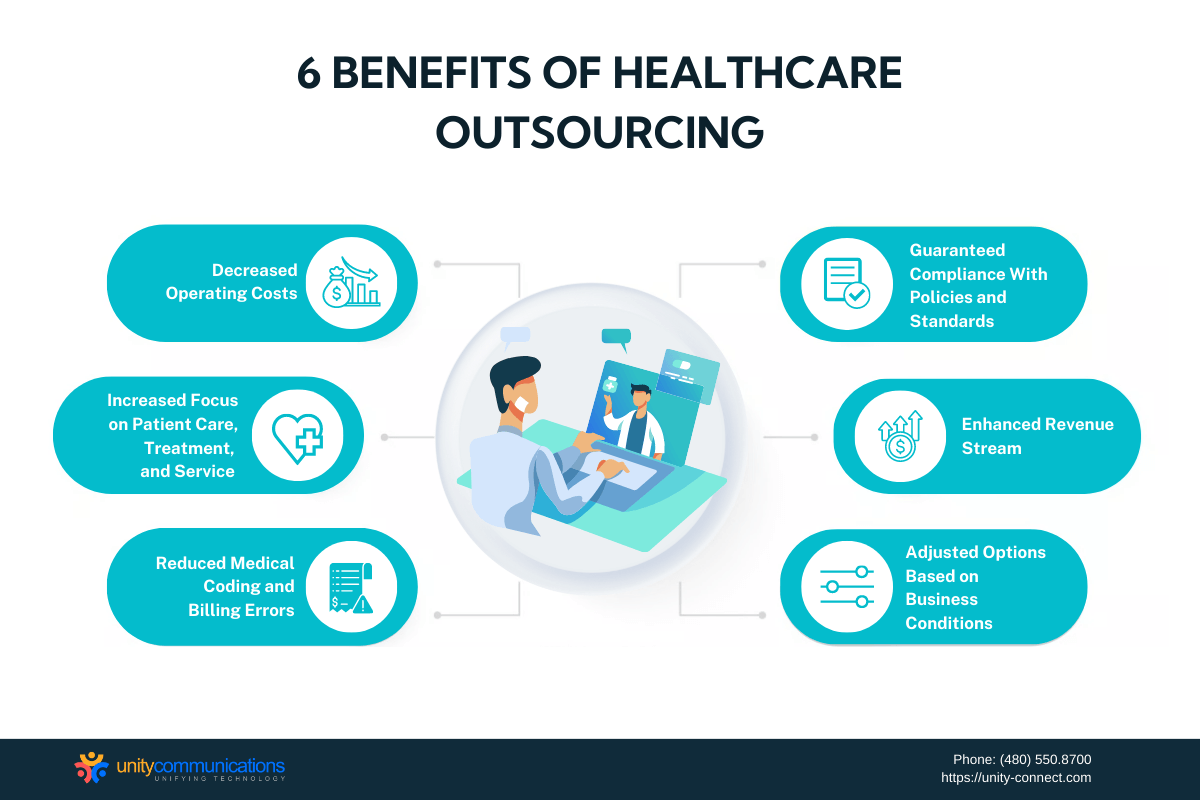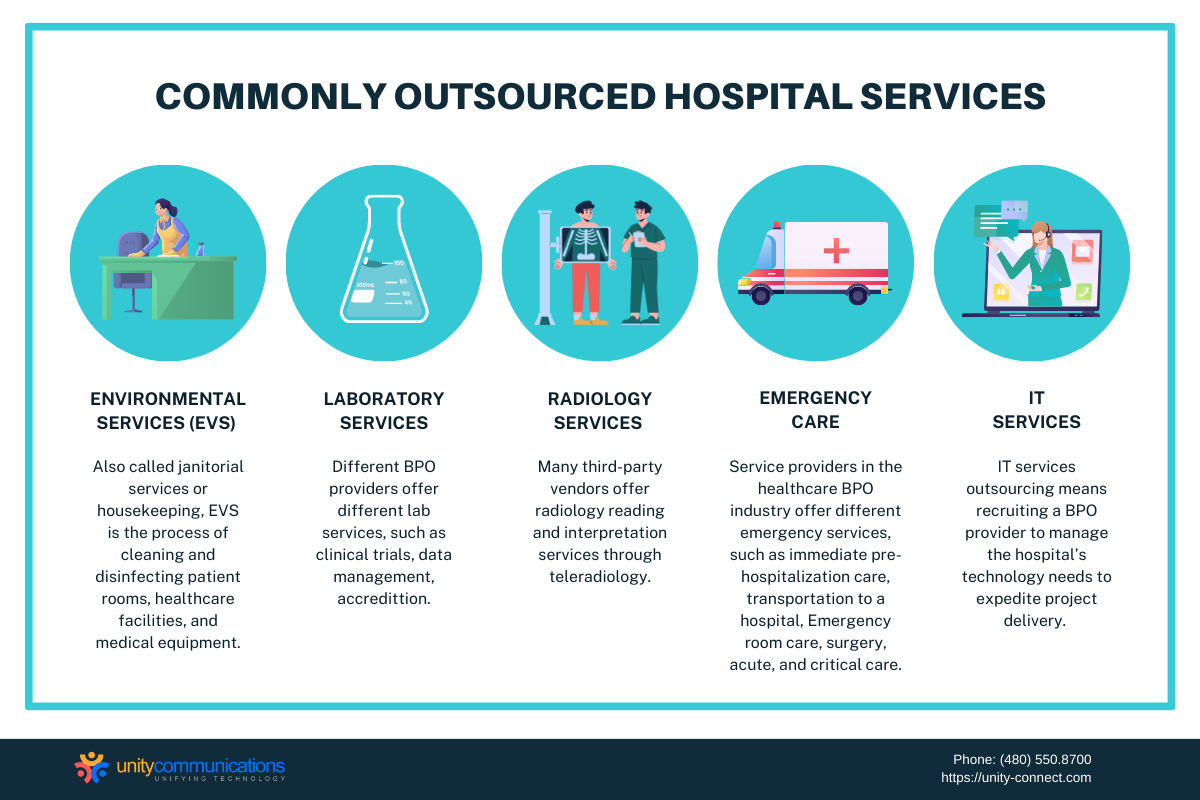Written by Rene Mallari
Contents
Running a hospital is one of the most challenging roles in healthcare. Records and personnel administration, physical plant maintenance, supplies, and inventories – all these and more are part of everyday life in a hospital. And above all, professionals – from executives to physicians to staff – must work together to deliver high-quality patient care.
This is why hospitals seek the help of outside experts to address the mountains of paperwork, to reduce workloads, and to simplify processes. Business process outsourcing (BPO) and healthcare BPO have become common due to the many opportunities they offer.
This article presents the benefits of outsourcing your hospital functions and the services you can outsource.
Read on to learn more.
What Is Hospital Outsourcing?

Hospital outsourcing is when a healthcare organization hires a third party to perform specific business processes. Typically a BPO company, this outside organization leverages manpower and advanced technology to provide the services a hospital needs to have done and doesn’t or cannot expend the manpower, time, or funds to do itself.
The BPO company performs assigned functions on-site or from a different location. Off-site operations fall into three categories:
- Onshore. The service provider operates in the same country as its hospital client.
- Nearshore. The third-party vendor works in a country close to the hospital’s headquarters.
- Offshore. The BPO firm operates in a country far from the client’s physical location.
Hospitals can outsource an entire department, such as accounting, or portions of it. Meanwhile, a service-level agreement (SLA) details the services the BPO company will provide. The SLA helps hospitals track the BPO partner’s performance.
Hospital Outsourcing Market To Accelerate
Precedence Research reports that the global hospital outsourcing industry might reach around $685 billion by 2030, double its 2020 value at a compound annual growth rate (CAGR) of almost 11% within the forecast period.
The study states that hospitals increasingly use outsourcing services to oversee internal processes such as medical billing, information technology (IT), and back-office operations. Outsourcing firms save healthcare organizations time, reduce their spending on infrastructure and technology, and increase their staffing flexibility.
Changes in the healthcare landscape are contributing to the upsurge in hospital outsourcing, too. In particular, the segment benefits from implementing electronic medical records and the rising frequency of patient visits.
North America is currently the most robust outsourcing market. Hospitals in major regions tend to operate with the latest healthcare infrastructure. But in North America, the aging population has better access to healthcare, contributing to widespread hospital outsourcing.
The report also notes that the Asia-Pacific region might register the fastest CAGR in healthcare outsourcing as organizations move toward digitization. Other reasons for the growth of hospital outsourcing include:
- Rising government spending on healthcare and accessibility of medical services
- Greater focus on sustainability, reducing paperwork in hospital management services
What Are the Benefits of Hospital Outsourcing?

Below are the six advantages of healthcare BPO services:
1. Decreased Operating Costs
Hospitals outsource non-core processes to reduce expenses and save on vital resources. They reduce job advertising, hiring, training, and other recruitment costs.
They also need not spend on additional facilities, equipment, or IT infrastructure. Nor do they need to worry about the upkeep of any physical or digital assets.
With outsourcing, the BPO provider shoulders all these costs. So you can use the extra resources for more important functions. For example, you can convert the spaces you have saved by outsourcing to create more patient rooms and treatment facilities.
2. Increased Focus on Patient Care, Treatment, and Service
Healthcare BPO services provide hospital staff a reprieve from repetitive and time-intensive activities.
Secondary activities such as medical data entry, coding, billing, and transcription are essential for healthcare institutions to survive and thrive. But they consume financial resources you can otherwise direct to patient services.
Delegating heavy tasks to our BPO partner frees up your time and energy, allowing you to zero in on patient needs, well-being, and satisfaction. Consequently, you build client loyalty, resulting in higher revenue.
Greater income means:
- Better employee compensation packages
- Higher investments in staff training and technology
- More diversified medical services
- Larger marketing budget to promote the hospital to new audiences
- Easier access to credit from banks and other financial institutions
Outsourcing improves your reputation and competitive edge by prioritizing your core competencies.
3. Reduced Medical Coding and Billing Errors
Medical coding and billing mistakes and delays affect your revenue cycle management (RCM). RCM is the process of managing and tracking income from patients and other healthcare services.
To avoid problems in this area, service providers have teams of experienced medical coders and billers to manage complicated insurance claims. These teams undergo regular training to update their skills and technical knowledge.
They process and submit timely, error-free, and accurate claims. They also aim to reduce, if not eliminate, rejections from insurers to maximize income collection for hospital clients.
Otherwise, weak RCM might lead to:
- Low staff morale. Slow collection translates to a tighter budget, but employees will still work the same hours. Demoralized staff have a higher risk of turnover.
- Slow or zero growth. Due to cash flow issues, you have difficulty expanding your hospital facilities or improving patient service.
- High ongoing expenses. Rejected insurance claims mean you have to rework them and pay extra charges for claims cleaning and resubmission fees.
- Poor patient experience. Inaccurate high billing can confuse patients and cause them to complain. If not addressed properly, such a situation can lead to more payment delays or non-payments.
A BPO company focuses on medical coding and billing operations, helping decrease errors that can lead to revenue loss. They reduce duplicate billing, unclean claims, incorrect patient data encoding, and authorization mistakes.
4. Guaranteed Compliance With Policies and Standards
Ever-changing government regulations and industry standards are obstacles in healthcare. They make medical coding and billing more difficult.
Here are the four medical coding systems that hospitals use to stay current and generate accurate and timely billing:
- Current Procedural Terminology (CPT) is a group of codes expressed in alphanumeric or numeric characters. Each surgical, medical, and diagnostic procedure has a designated CPT code. Public and private insurance providers rely on CPT codes to determine the amount to disburse to the hospital or the individual claimant.
- International Classification of Diseases (ICD) is the global standard set by the World Health Organization (WHO), consisting of diagnostic codes and updates to categorize diseases and illnesses. WHO’s latest update is ICD-11, released in January 2022.
- Diagnosis Related Group (DRG) is a medical system that identifies a patient’s hospitalization expenses. Health insurers, including Medicaid and Medicare, use DRG to determine the costs incurred for a person’s hospital services and facilities.
- Healthcare Common Procedure Coding System (HCPCS) is a set of medical codes explaining the products, supplies, and services available to all insurance claimants.
Tapping into medical BPO services lets you keep pace with federal policies and requirements. A third-party provider monitors the latest developments while you focus on patient care and service. You can be sure your operations are compliant, thus avoiding government penalties and fines.
5. Enhanced Revenue Stream
A service provider’s expertise is in collecting patient payments and insurance claims. It monitors outstanding claims, unsettled balances, and partially paid receivables.
Your BPO partner follows and pursues unpaid amounts legally and ethically. It conducts collection activities faster than your in-house team.
Additionally, it lowers medical coding and billing oversights by scrubbing or cleaning claims for accuracy. It then submits claims to insurance providers for a better chance of speedy approval and disbursement.
6. Adjusted Options Based on Business Conditions
A BPO company scales per your requirements and activities. It gives you extra muscle to meet rising demands when you are overwhelmed with patient visits. You pay for fewer resources when patient volume, business transactions, or medical activities are slow.
The scalability of BPO firms helps you operate without interruptions while you pay according to business performance. They do not tie you to a fixed-rate agreement, in which service charges are constant whether you make a profit.
So when business is bustling, you pay more. But you pay less when the opposite is true.
What Services Can Hospitals Outsource?

Hospital outsourcing involves delegating processes such as:
Environmental Services (EVS)
Also called janitorial services or housekeeping, EVS is the process of cleaning and disinfecting patient rooms, healthcare facilities, and medical equipment.
EVS protects personnel and patients from healthcare-acquired infections (HAIs) and other illnesses. It ensures facilities are clean and well-maintained, improving the hospital’s image.
Outsourcing EVS has become an increasingly important activity since the pandemic. A third-party provider has trained and experienced technicians, effectively coordinating with hospital staff and communicating with patients. They help improve patient safety and experience.
Laboratory Services
Outsourcing laboratory services means delegating the performance of different tests on patients’ biological samples. Third-party medical technologists conduct laboratory procedures and tests, helping physicians treat patients.
Different BPO providers offer different lab services, such as the following:
- Clinical trials involve enlisting volunteers to check and monitor possible treatments for efficacy and safety.
- Data management refers to storing, cleaning, and protecting large amounts of lab data.
- Accreditation entails getting the approval of a quality management system. One accreditation is ISO 17025, which shows that a laboratory is competent to deliver testing and calibration outcomes.
Radiology Services
Many third-party vendors offer radiology reading and interpretation services through teleradiology. This procedure refers to the electronic transmission of images from a hospital to the service provider’s location for analysis.
Hospitals outsource radiology services, such as:
- Computerized tomography (CT)
- Magnetic resonance imaging (MRI)
- Ultrasound, X-ray, positron emission tomography (PET)
- X-ray
Third-party vendors provide access to certified radiologists for consultations. The team delivers fast turnaround times so that hospital employees and patients can obtain radiology results quickly.
Emergency Care
Service providers in the healthcare BPO industry offer different emergency services, such as:
- Immediate pre-hospitalization care
- Transportation to a hospital
- Emergency room care
- Surgery, acute, and critical care
Hospitals outsource their emergency care services to decrease casualties. Service providers offer a skilled workforce and the latest equipment to improve patient treatment and save more lives.
Moreover, a third-party provider hires board-certified emergency physicians responsible for treating patients quickly and courteously. It also provides various management arrangements and modifies them based on the hospital’s requirements.
IT Services
IT services outsourcing means recruiting a BPO provider to manage the hospital’s technology needs to expedite project delivery.
Most hospitals cannot fully oversee IT infrastructure and integration systems because these are labor-intensive and complex tasks. Different IT functions, including data security, network management, help desk, and application support, can require a host of specialist employees.
A third-party technology provider specializes in this area. It can also keep up with the dynamic government standards and industry protocols.
The Bottom Line
Hospital outsourcing provides several benefits that enhance a healthcare organization’s performance, productivity, and revenue. More importantly, the strategy improves its core competencies—patient care and services.
A word of advice: outsource cautiously. Not all service providers can align with your primary objective of providing the best patient care. Maximizing profits is the ultimate motive of some would-be partners. Hiring a BPO firm with that agenda might result in higher costs, poor patient experience, or demoralized in-house staff.
Conduct thorough research first. Examine service providers and ask for their credentials and client feedback.




